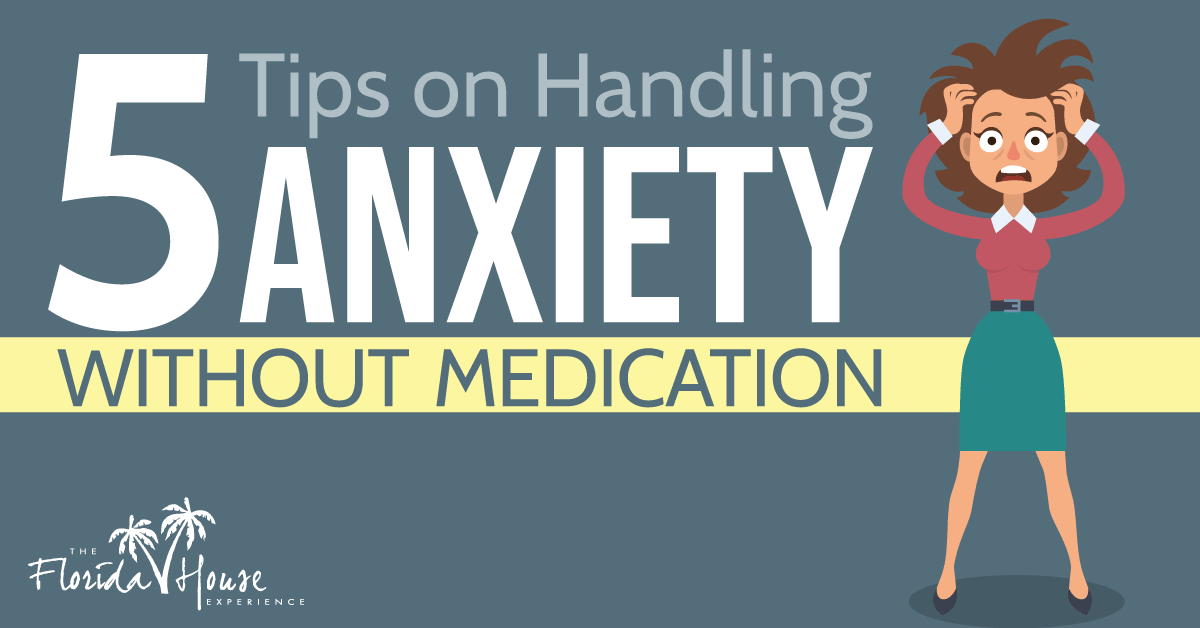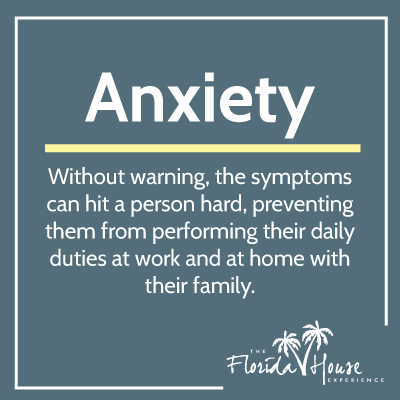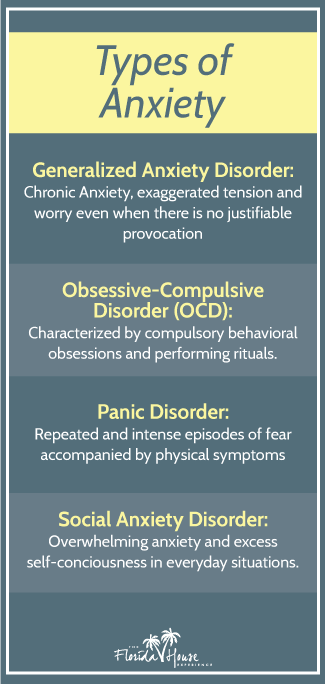
Are you struggling with a mental illness, but do not want to take medication? Breaking the stigma around mental illness is something that FHE Health wants to accomplish, and as a result, we would love to talk today about anxiety. We have a few tips about how to cope, which is so important in a day and age where mental illness is increasingly common. The 5 types of anxiety are as follows.
- Generalized Anxiety Disorder
- PTSD (Post Traumatic Stress Disorder)
- OCD (Obsessive Compulsive Disorder)
- Social Anxiety
- Panic Disorder
If you have any of the above or think you might, please read this post and reach out to us. We are here to help you in any way possible.
What Is Anxiety?
 Anxiety is a mental health disorder characterized by feelings of worry or panic. That is anxiety at the most basic level. This can be characterized by panic attacks, and symptoms include stress that’s out of proportion to the impact of the event, an inability to set aside a worry, and restlessness. However, it is not as simple as “not worrying” “going outside”, “relaxing” or “feeling better.” People who struggle with any mental illness have a chemical imbalance in the brain. Many people who struggle with mental illness may be told to just get better on their own. Well, unfortunately, it is just not that simple. The reason being, people who struggle with anxiety have a chronic condition that is not easily shaken with willpower. Thus, it is necessary for individuals who are struggling with any mental illness, but in this case anxiety, to get the help they need. Luckily, we at the Florida House Experience are ready to help you. Our team is comprised of the most experienced and well-regarded doctors and professionals in the mental health world and would love to help you with quick advice, answers to questions, or complete treatment at one of our facilities.
Anxiety is a mental health disorder characterized by feelings of worry or panic. That is anxiety at the most basic level. This can be characterized by panic attacks, and symptoms include stress that’s out of proportion to the impact of the event, an inability to set aside a worry, and restlessness. However, it is not as simple as “not worrying” “going outside”, “relaxing” or “feeling better.” People who struggle with any mental illness have a chemical imbalance in the brain. Many people who struggle with mental illness may be told to just get better on their own. Well, unfortunately, it is just not that simple. The reason being, people who struggle with anxiety have a chronic condition that is not easily shaken with willpower. Thus, it is necessary for individuals who are struggling with any mental illness, but in this case anxiety, to get the help they need. Luckily, we at the Florida House Experience are ready to help you. Our team is comprised of the most experienced and well-regarded doctors and professionals in the mental health world and would love to help you with quick advice, answers to questions, or complete treatment at one of our facilities.
Some symptoms of anxiety may include an extreme stress that outweighs the reality. Along with this, many patients experience a shortness of breath or the feeling that they are struggling to inhale air, even though they are breathing normally. Waking up at night, insomnia, and extremely harrowing nightmares are also a symptom of anxiety. Anxiety can affect individuals when they are sleeping, meaning their stress will not allow them to sleep, their anxiety nightmares will keep them awake at night, or their shortness of breath prevents relaxation. Anxiety may also come upon a person even when they are having a normal, stress-free day. Without warning, the symptoms can hit a person hard, preventing them from performing their daily duties at work and at home with their family. Aside from the inconvenience to normal duties, it ultimately takes the joy and happiness out of daily life. This is why seeking help for anxiety is so vital.
Different Types of Anxiety
 There are five major types of anxiety disorders. The first being Generalized Anxiety Disorder. Generalized Anxiety Disorder is mostly what we described above, and it is defined by a propensity to be extremely stressed with little to no provocation. Generalized Anxiety Disorder is the most common.
There are five major types of anxiety disorders. The first being Generalized Anxiety Disorder. Generalized Anxiety Disorder is mostly what we described above, and it is defined by a propensity to be extremely stressed with little to no provocation. Generalized Anxiety Disorder is the most common.
Obsessive Compulsive Disorder (OCD) is the second type of anxiety. It is defined by a pattern, or patterns, of recurring thoughts or urges. These are the obsessions, and the compulsions are the need to do these things. It is not simply being a neat freak, a more realistic (but extreme) example is having to turn the lights off and on repeatedly every time one enters a room. OCD comes in a variety of different forms and is typically associated with unique behaviors for each person.
Panic Disorder is what many would refer to as a panic attack. It is mostly associated with unexpected episodes of heightened fear, anxiety, chest pains, palpitations, shortness of breath, dizziness, or abdominal stress. These are less constant and episodic in nature. They can come at any time and can be completely debilitating.
Post-Traumatic Stress Disorder (PTSD) is the fourth kind of anxiety. This is in relation to an extremely shocking or traumatic experience in one’s life. Commonly seen, unfortunately so, in veterans, it can also be a result of abuse in early childhood, whether verbal or physical, some form of harm caused by a natural disaster, or any other kind of traumatic event. These events, or reminders of these events, will trigger the patient into a state of anxiety.
Social Phobia or Social Anxiety Disorder is the final form of anxiety. It is characterized by a fear of interacting with others in social environments. Whether this is, public speaking, general socializing, or one on one conversations.
How to Cope
You are you. Only you know yourself completely, but it is still important to learn from doctors who have helped people similar to you. The first step to getting help is to reach out. That being said, what do you enjoy? What is it, that when you do it, you become a more full person, and make the world around you a better place?
First, is holistic care. Holistic care is a practice that involves caring for the whole being through actions like yoga, meditation, or general self-reflection. It might shock some people to think of meditation as something that is not a monk on a mountain humming. Meditation is the practice of being completely aware of the self and the world around you. It is actually, one of the better ways to practice holistic care.
Second, is experiencing an active lifestyle. While you may hate going to the gym, exercise is a statistically proven way to improve your state of mind, health, and mental state. Of course, you are not going to just get better after working out once. However, the act of getting active releases endorphins in your brain. This does not mean you have to get a membership at LA Fitness, whatever gets you moving that makes you happy is what you should do. Swimming, jogging, yoga, biking, and dance classes are all great ways to exercise.
Third, go out into nature. Some people take “nature baths” where they simply lay out in the open environment. Maybe that sounds crazy to you, but being in nature has been proven to improve our mental status tremendously.
Four, find some ways to be creative. What kind of hobby do you have to exercise your brain? Stimulating your brain in creative ways such as journaling, drawing, singing, painting, or cooking are all ways you can be productive. Being productive in small ways like doing laundry and making your bed give you a feeling of accomplishment.
Five is extremely important. Build a support network. You have people who care about you and want the best for you. They are waiting for you to reach out and talk to them. Breaking the stigma around mental illness and recovery is sometimes as simple as one honest and vulnerable conversation at a time. Even when speaking to family members or friends who may not understand your anxiety issues, it is still very beneficial to vent and get their opinions. As your support network builds, it becomes easier to deal with anxiety issues.
Connecting
Are you struggling with an anxiety disorder? Do you need help to take your life back from mental illness? Look no further. We at FHE Health want to come alongside you and help you regain control of your life. If you have any question please do not hesitate to reach out. We have a 24-hour contact number (833) 596-3502, and contact page. Please get help today, let us go on this journey with you. We employ some of the best doctors and psychologists in the country and are committed to helping people no matter what the financial or medical situation is. We have experience helping thousands of people with mental health and behavioral health issues and can help you too.






